Dental Implants, Lansdale PA
Dr. Gross has received extensive training in Implantology. He has been successfully placing implants since 1999. Through continuing education and teaching, he provides the most advanced techniques in implant dentistry.
Dental implants are designed to provide a foundation for replacement of teeth that look, feel, and function like your natural teeth. The person who has lost teeth regains the ability to eat virtually anything and can smile with confidence. The teeth appear natural and youthful facial contours will be preserved preventing early aging of the face. The implants themselves are tiny titanium posts that are placed into the jawbone where teeth are missing. The bone bonds with the titanium, creating a strong foundation for artificial teeth.
Dental implants are changing the way people live! With them, people are re-discovering the comfort and confidence to eat, speak, laugh and enjoy life. Please call us for a consultation if you are considering getting dental implants in Lansdale, Pennsylvania.

Dental Implants Presentation
To provide you with a better understanding of dental implants, we have provided the following multimedia presentation. Many common questions pertaining to dental implants in Lansdale, PA, are discussed.
Replacing a Missing Tooth
 Dental implants form a bond with the bone in the jaw bone.
Dental implants form a bond with the bone in the jaw bone.A natural tooth is anchored into the jawbone by its tooth root. Tooth roots attach firmly to the jawbone and keep your teeth stable when chewing solid foods.
Traditionally, if you were missing a tooth or if one needed to be extracted, the healthy teeth on either side of the missing tooth would be cut down and replaced with a three-unit "bridge."
Dental implants are the modern alternative. Instead of cutting down two perfectly healthy teeth, your periodontist inserts a dental implant into the jawbone to replace your missing tooth root. The implant becomes solidly fixed into your jaw bone (osseointegration). Your general dentist then places a crown onto this artificial tooth root that looks, feels, and functions like your natural tooth.
Quite simply, dental implants are the most natural replacement for missing teeth.
Replacing Several Missing Teeth
Traditionally, several missing teeth would have been replaced with a removable partial or full denture.
Dentures have to be taken out and soaked at night. During the day, they can also look unnatural and rub painfully. Dentures and partials make it difficult or impossible to eat certain foods.
 Dental implants can now be used to anchor partial and full dentures. This prevents the slipping, irritation, and pain associated with "floating" partials and dentures. It also prevents the tedious removal of dentures for overnight soaking and cleaning. Dental implants also eliminate the need for denture adhesives. This allows you to enjoy eating the foods you previously avoided. With dental implants, your partials or dentures are firmly anchored to the jawbone, allowing them to feel much more like natural teeth.
Dental implants can now be used to anchor partial and full dentures. This prevents the slipping, irritation, and pain associated with "floating" partials and dentures. It also prevents the tedious removal of dentures for overnight soaking and cleaning. Dental implants also eliminate the need for denture adhesives. This allows you to enjoy eating the foods you previously avoided. With dental implants, your partials or dentures are firmly anchored to the jawbone, allowing them to feel much more like natural teeth.
Natural tooth roots and dental implant posts are fixed firmly in your jawbone. When you chew, these tooth roots and posts stimulate the jawbone and prevent it from shrinking. You may have seen a person who looked prematurely old because their jawbone had shrunk after wearing floating dentures. Dental implants help preserve your jawbone and appearance.
The Success Rate of Dental Implants
After their healing period, the success rate of dental implants is between 94% and 98%. If you are a non-smoker with good oral hygiene, the percentage is closer to 98%.
Does the Procedure Hurt?
The discomfort involved with receiving a dental implant is similar to that of having a cavity filled. It is done under local anesthesia and patients generally experience little discomfort after the procedure.
How Long Will Dental Implants Last?
Dental implants become fixed to the jawbone. Though the life span of a dental implant will vary with each patient, many have lasted for more than 50 years. With good oral hygiene and regular cleanings, dental implants should last a lifetime. In contrast, the average life span of a traditional fixed bridge is between 10-15 years.
Precision Implant Placement with 3-D Imaging
A key to dental implant safety and success is advanced radiography. A CT scan ensures that every possible precaution has been made to reduce the risk of involvement of the nerves in the lower jaw, and the sinuses and nose in the upper jaw. This helps to reduce chair time and the possibility of complications.Until recently, CT scans were only done in hospitals or medical facilities.
Click Here to Learn More About Our Advanced Dental Imaging
Bone Regeneration
A critical question in determining whether an implant can be placed is, "Is there enough bone to support the implant?" Fortunately, advanced bone regeneration techniques now make it possible to place many more implants than just 10 years ago. For more information on bone regeneration, please see the articles on Bone Grafting.
Am I a Candidate for Dental Implants?
Dental implant treatment begins with an evaluation to determine if you are a good candidate for this procedure. Please contact the office for an examination and consultation. We look forward to hearing from you.
For More Information
The following sites will provide you with more information on dental implants:
- Nobel Biocare
- MissingTeeth.org website for the Institute for Dental Implant Awareness (IDIA).
- Academy of Osseointegration
-
American Academy of Periodontology Article:
Dental Implants: Teeth That Look and Feel Like Your Own - American Dental Association - Implants





